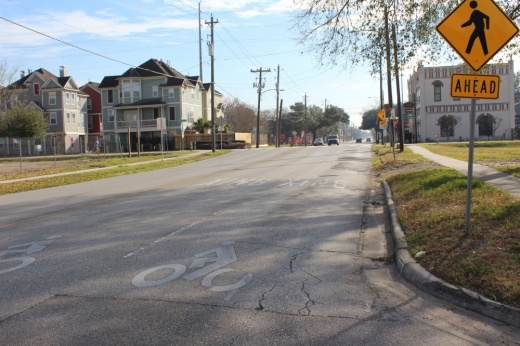Editor's note: This article was updated to include the correct age of Virginia Rangel's son.
After hours of discussion and listening to community comments, members of the Greater Heights Super Neighborhood Council agreed on writing a letter in support of a proposed 11th Street Bikeway project at the group's May 17 quarterly meeting.
As previously reported by Community Impact Newspaper, the bikeway will make improvements along a 1.5-mile stretch of 11th Street between Shepherd Drive and Michaux Street, as well as on Michaux from 11th Street to north of Stude Park.
The project is being planned and carried out by the city of Houston and is roughly 90% of the way through the design phase. Central to the project is the implementation of a "road diet"—or a reduction in vehicle lanes—and the addition of new protected bike lanes.
The project has garnered support from some residents and biking advocates, while others have expressed concerns about safety and the effects on businesses. During the May 17 meeting, the GHSNC and audience members heard one representative speak from both sides.
Virginia Rangel, a Heights resident of four years, spoke in support of the bikeway. She said she has a 10-year-old son who rides his bike to Harvard Elementary School, and every day, twice a day, he crosses 11th Street.
According to Rangel, a car has never stopped for him. All she wants to see, she said, are safety measures implemented.
Rangel said she thinks cars also drive too fast along 11th Street, a claim backed by research by city of Houston planners, who found drivers average 38.5 miles per hour on the specified portion of the street even though the speed limit is 30 miles per hour. In addition to making room for the bike lanes, the road diet is also designed to slow down traffic, which planners say happens naturally when drivers are given less space.
Rangel said she wants to see an end to reckless driving.
“I would love to see an 11th Street where cars go the speed limit,” Rangel said. “Having a slower street will make it safer for families.”
Heights resident Jerry Gause spoke against the project. He said he thinks reducing the lanes from four to two will create traffic congestion and result in vehicles being diverted to other streets in the neighborhood, something he said he fears will present new safety issues and risks for pedestrians on those streets. Houston planners previously said they do not expect the road diet to divert traffic but would monitor for such occurrences once the project was completed and make adjustments if necessary.
Gause also said the reconstruction and lane reduction could cause trouble for businesses when they are receiving deliveries due to the lack of a center turn lane at certain points of the proposed plan. However, when council members asked Gause what specific businesses would be affected by the delivery issues, he replied that could not answer. Community Impact Newspaper has reached out to several 11th Street businesses within the proposed scope of the plan for comment.
Some attendees also spoke about the danger at the intersection of Nicholson and 11th streets and the need for a better crosswalk for pedestrians.
After hearing from both sides, the council voted to write a letter of support for the 11th Street bike lane construction. However, council members said the approval comes with caveats that the city continue to monitor for traffic diversion and negative effects on local businesses after the project is completed. The letter will also emphasize that the Nicholson intersection be addressed regardless of the fate of the broader project.
Council President Mark Williamson pointed out that, although the council is writing the letter, it does not have an actual say in the project’s construction.
“Ultimately, it’s the city’s decision,” he said.
As previously reported by Community Impact Newspaper, the bikeway is being assessed by Houston Mayor Sylvester Turner.





